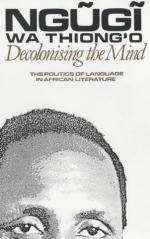
|
| Name: _________________________ | Period: ___________________ |
This test consists of 15 multiple choice questions and 5 short answer questions.
Multiple Choice Questions
1. Where was Janheinz Jahn from?
(a) The Netherlands.
(b) France.
(c) Germany.
(d) Greenland.
2. What did Sydney Portier say he had come to associate Africa with as a result of the literature he had read?
(a) Lions.
(b) Tigers.
(c) Snakes.
(d) Witches.
3. When did the production of Maitũ Njugĩra begin?
(a) July, 1982.
(b) November, 1981.
(c) September, 1976.
(d) March, 1977.
4. When was Ngũgĩ wa Thiong’o arrested as a result of the production of Ngaahika Ndeenda?
(a) March 30, 1977.
(b) September 12, 1976.
(c) December 31, 1977.
(d) October 2, 1977.
5. What statement largely sums up the author's central theme in Chapter 1, Part IV?
(a) Culture reflects history and communication carries history.
(b) Culture creates communication, and communication is a means to culture.
(c) Communication creates culture, and culture is a means of communication.
(d) Culture and communication are unnecessary.
6. What does the author refer to as being the basis of a people's identity in Chapter 1, Part IV?
(a) Economy.
(b) Values.
(c) History.
(d) Family.
7. The author states in Chapter 2, Part V that "In the opening line of The Black Hermit the peasant mother is made to speak in a poetic language reminiscent in tone of" whom (43)?
(a) Edgar Allan Poe.
(b) Byron.
(c) Shakespeare.
(d) T.S. Eliot.
8. When was The Black Hermit first produced?
(a) 1944.
(b) 1969.
(c) 1959.
(d) 1962.
9. What does "Caitaani mutharaba-Ini" translate to in English?
(a) Mother Sing for Me.
(b) I Will Marry When I Want.
(c) Devil on the Cross.
(d) A Meeting in the Dark.
10. In Chapter 1, Part IV, the author states that "Language, any language, has a dual character: it is both a means of communication and" what (13)?
(a) "A carrier of history."
(b) "A symbol of unity."
(c) "A carrier of culture."
(d) "A product of necessity."
11. How far is Kamĩrĩĩthũ from Nairobi?
(a) 30 km.
(b) 50 km.
(c) 10 km.
(d) 20 km.
12. When did the Kamĩrĩĩthũ Community Education and Culture Center begin functioning?
(a) 1978.
(b) 1979.
(c) 1982.
(d) 1976.
13. Who wrote Catching Them Young?
(a) Thomas Jefferson.
(b) Sir H. Rider Haggard.
(c) Gabriel Okara.
(d) Bob Dixon.
14. The author poses the question in Chapter 1, Part VIII, "What is the difference between a politician who says Africa cannot do without imperialism and the writer who says Africa cannot do without" what (26)?
(a) "European culture."
(b) "Western philosophies."
(c) "Western ideologies."
(d) "European languages."
15. Who wrote Contes d'Amadou Koumba?
(a) Martin Carter.
(b) Gabriel Okara.
(c) Amos Tutuola.
(d) Birago Diop.
Short Answer Questions
1. What does the author say the real aim of colonialism was in Chapter 1, Part V?
2. In Chapter 1, Part I, the author asserts, "The choice of language and the use to which language is put is central to" what (4)?
3. What does the word "vacillating" mean as used in Chapter 1, Part VI?
4. In his Introduction, the author states that the theme of this book is taken from a poem by what Guyanese poet?
5. What does the Ituĩka ceremony mark?
|
This section contains 506 words (approx. 2 pages at 300 words per page) |

|




